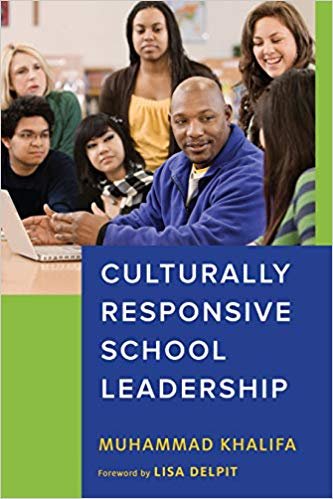Culturally Responsive School Leadership
Book Review

Muhammad Khalifa’s book on culturally responsive school leadership – an increasingly important expectation in Canada’s racially and ethnically diverse schools – is both a paradigm shifter and a practical tool.
His arguments are unconventional and controversial, but they provide a critically important challenge for high school principals. Based on substantial data collection, a two-year ethnographic study, and his experience as an educator, Khalifa argues that the heart of leadership must be in the community rather than just in the school. To support “minoritized,” marginalized students who have become disengaged with school, principals must reach out to students and their families, bringing the local cultural knowledge into the classroom, curricula, and policy decisions.
Khalifa does not duck talk of historical oppression and present power; he emphasizes the need for all staff to engage in ongoing critical self-reflection that goes beyond the personal to challenge the systemic structures that create an inequitable environment.
Although Khalifa’s text pertains specifically to high school principals in the U.S., it is relevant to the Canadian context, especially in schools with populations of students of colour and Indigenous peoples. One shortcoming is that despite encouraging the use of Indigenous knowledge, Khalifa does not provide many specific examples of that work.
Khalifa’s inspiration comes from “Joe,” an urban principal in an alternative high school where failing students from other schools are sent. Substantial data – including “equity audits” and an intensive study of this ground-breaking principal – reveal what anti-racist, community-honouring, and high-expectations education can look like. Joe’s strategies include everything from ignoring culturally based behavioural rules in order to honour students’ identities (e.g. wearing saggy pants, loud talk, or swearing) to expecting teachers to become involved in community issues and incorporate these concerns into their curricula. Finally, he invites community members to have a say in school affairs and policy making. As a trusted “warm demander,” Joe’s care of students, teachers, and parents lead to a blossoming of students’ self-esteem, self-advocacy, and academic success.
Khalifa’s charts, activities, and end-of-chapter discussion questions are invaluable “how to” tools. Courageous conversations about equity are essential, but this text argues that talk must be matched with brave, persistent action. This is a persuasive new perspective for all educational leaders willing to take a leap to make their schools deeply culturally responsive – well worth reading.
First published in Education Canada, September 2019
Harvard Education Press. 2018
ISBN: 978-1682532072
